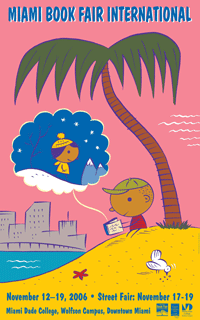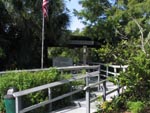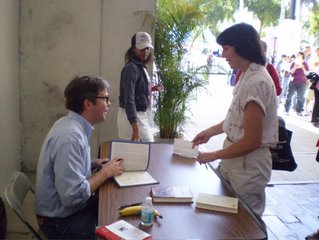 Authors I met:
Authors I met:
* Kurt Andersen
* George Kalogerakis
* Jonathan Franzen
* Dave Barry
* Ridley Pearson
* Carl Hiaasen
Books I either bought in advance specifically for the fair, bought at the fair, or had signed at the fair:
* The Discomfort Zone, by Jonathan Franzen
* How to Be Alone, by Jonathan Franzen
* Nature Girl, by Carl Hiaasen
* Spy: The Funny Years, by Kurt Andersen, Graydon Carter, and George Kalogerakis
* The Partly Cloudy Patriot, by Sarah Vowell
* The Real Thing, by Kurt Andersen
* Surviving Justice, compiled by Lola Vollen & Dave Eggers
* Turn of the Century, by Kurt Andersen
* The Republican Playbook, by Andy Borowitz
Free merchandise from the fair:
* CD: Attaining the Worlds Beyond (ref. www.kabbalah.info)
* Orange kazoo from Don't Quit Your Day Job Records
Pre-fair activities: Meeting my imaginary friend!
Tina (aka "TBG") and I met some months ago on Achenblog and became email-pals. Despite the cynicism of her children ("Stranger Danger, Mom!!") she took the risk of flying to Florida to meet me and go to the book fair. She turned out to be just as nice in person as she was in her emails, and we got along perfectly. Tina is very smart (and brought plenty of electronic gadgetry), and we navigated various challenges (finding parking! renting beach chairs with no cash or credit card! negotiating the hopelessly mismarked streets of Miami!) with panache. At one point I remarked, "The two of us together make one extremely intelligent person." It was an unmitigated pleasure to share the book fair experience with my new friend.
Tina arrived at the Fort Lauderdale airport at 1:00 Friday. After a quick lunch we continued to Fern Forest Nature Center for some acclimation. Welcome to Florida, Tina! 

Saturday, 11/17/06: Book Fair, Day One
11:00 a.m. Kurt Andersen and George Kalogerakis
Introduced as the "Lennon and McCartney of magazine publishing," Kurt and George were appropriately witty and humble--actually, I believe the introduction implied that Andersen and Graydon Carter were like John and Paul, so George, ironically, claimed, "I'm Ringo." Utilizing the latest in electronic audio-visual technology, they showed covers from Spy magazine and talked about some of their adventures producing same. Spy never shrank from a story because it might offend; on the contrary, the editors delighted in skewering sacred cows (e.g. The New York Times), socialites, moguls and so on. They were regularly threatened, harangued, and despised. The staff at The Times denied that they ever read the magazine (harumph!) Maybe the best lawsuit-threatening letter came from Gore Vidal, who took umbrage at having been characterized as "litigious," closed his letter, "See you in Federal Court," and according to Andersen, "completely missed the irony." Donald Trump was a favorite target and also a frequent correspondent; they would post his letters on a centrally located bulletin board for the enjoyment of all the staff at Spy.
At the end of their presentation, I followed them down the hall and around a few corners to the signing location. However, most (well, virtually all) of the other audience members, including Tina, stayed behind to hear Dave Barry and Ridley Pearson. I had expected to have some time standing in line to compose my remarks but that didn't happen, and I'm afraid I blurted out some less than intelligible explanation of my experience with Andersen's first book, The Real Thing. But I did produce the artifacts: the ancient, yellowed and battered copy of the book and the letter Kurt wrote me back in 1980. I got all my books signed, and there was a huge opportunity to just hang out and chat that I basically just squandered. However, this is where the cyberevent happened. Me: "This letter is evidence that I am your 'first fan.'" Kurt: "You blogged about this, didn't you? Somebody sent it to me." That rearranged my world in a half-second.
Kurt was very nice. He said he has a new book--a novel--coming out in March. It's called Heyday; I have pre-ordered it from Amazon and hope it will arrive by my birthday.
[Aside to Kurt Andersen, in case you're reading this: Hi, it was amazingly wonderful to meet you! I'm looking forward to reading the new novel.]
I went up to the second floor and I was looking out into space, still smiling from my encounter with Andersen. I looked over to the escalator; I caught the eye of someone coming up the escalator, and he smiled back at me, then I focussed, and did a double-take, like in the movies: it was Andy Borowitz. Hi, Andy.
1:00 p.m. Jonathan Franzen
The line for Franzen was long, but I was near the front. I had about a half hour to wait, and I watched the other people, looking for clues as to what sort of person is a Franzen enthusiast. I turned to a young man near me and said, "which do you read, the novels or the essays?" His face lit up and he said, "Oh, both! I'm a fan!" We talked about the books and about how we imagined the author would be in person. A few minutes later, he turned to his friend and said, indicating an older woman who had just walked by, "Look who that is!" and then he went up to the woman and said, "Ms. ----- You were my fifth grade teacher! and his too! You were great, I remember that class so well. I am a teacher now, and (friend's name) is a middle school counselor!" The woman was so happy to see her former students--she called over her friend and told her all about it, and we were just having a total love-fest there in the line. The guys continued to talk about how important fifth grade is, and I was tempted to tell them: my fifth grade teacher was the most inspirational teacher I ever had, too, to the point that my first career goal was to be a fifth grade teacher, and I actually achieved it in a very short-term way. So maybe, in a strange way, this explains what a characteristic Franzen fan is like. Or maybe I was just caught up in a coincidence eddy.
Franzen was great, not at all nervous; although he seemed to be trying to come across as neurotic and tortured, really it was clear that he was glad to be there and he was an excellent reader and speaker. He said that he worked on The Corrections from 1993 until 2000, but did most of the writing in the last year. So during the six years of chronic writer's block, he said he "took small breaks from the punishing failure of that endeavor" to write short pieces about his life, and those pieces are part of his latest publication, The Discomfort Zone. He said he had learned from that writer's block experience that it is better to not write a novel for five or six years and then actually write the novel in that last productive year.
After he read the opening passages from his book, we had Q&A; the questions were incisive and thoughtful. Someone asked about his portrayal of his family, and he said he hates the term "dysfunctional." "If you saw the movie Little Miss Sunshine," he said, "that family is not dysfunctional. That family is very functional. They may be strange, but..." He then characterized his role in his own family as being analogous to a U.N. special envoy who arrives late on the scene in a bloody war zone--his parents being "two strong and mutually hostile personalities."
The line for the book signing was pretty long, too, but Franzen was perfectly nice and friendly. I told him that How to Be Alone is "my favorite book" and he smiled and said he appreciated my saying so. I gave him my copy of the Believer magazine because it has an article in it by a woman from his home town who has a lot in common with him and has felt beleagered because he keeps writing all her best stories before she can get to them--and writing them better than she ever could. It's a witty story; I hope he enjoys reading it.
said he appreciated my saying so. I gave him my copy of the Believer magazine because it has an article in it by a woman from his home town who has a lot in common with him and has felt beleagered because he keeps writing all her best stories before she can get to them--and writing them better than she ever could. It's a witty story; I hope he enjoys reading it.
As we were walking back from Franzen's signing area, Tina spotted Dave Barry's guitar on the other side of a glass wall. We went downstairs, and as we were crossing the plaza I saw the man himself, walking towards us with his co-author, Ridley Pearson. I alerted Tina; she was the one who said, "Hey, Dave!" and stopped him in his tracks. He was as gracious as he could possibly be, and we chatted him up, explained about the Achengirls Gone Wild weekend, and Ridley took our picture. Big thrill. If we'd had any regrets about missing Barack Obama's talk they were gone now; no question we were going to be sitting up front for the Rock Bottom Remainders concert Saturday night.
========
Book Fair, Day Two: 11/19/06
10:00 a.m. Carl Hiaasen
Carl's presentation was excellent. He didn't read from his book, but instead gave a verbal "treatment" of it that amounted to a great advertisement; I don't think anyone could listen to him describe the characters and outline the plot and not want to read this book. Nature Girl. I whole-heartedly recommend it, even though I haven't read it yet.
I won't try to describe the book other than to say it is vintage Hiaasen and will no doubt be a movie eventually.
Tina and I both stood in line to get our books signed, and it was a long line. Carl was very charming. We spread the Achenblog word there too and even presented him with a souvenir A-blog business card. I'm sure he'll treasure it. I took a bunch of them to the fair but that was the only time I remembered to give one away.
After one last swoop through the booksellers' stalls, we left downtown Miami and headed for the beach, where we (yes...) read our books for a couple of hours and decompressed (yes, later in the evening we did hang out at the hotel bar; no, we did not pick up any stray conventioneers.)
Too soon, the weekend was over, but the memories are still making me smile. Tina's account was much more timely (it was posted over a week ago...) She's quicker and more technologically up to date than I am.
Hey, it's only about 11 1/2 months until the 2007 Miami Book Fair. Mark your calendar, come on down.
 Robert Wright was brought into focus for me when he invited Joel Achenbach to participate in his "diavlog" at Bloggingheads.tv (check him out
Robert Wright was brought into focus for me when he invited Joel Achenbach to participate in his "diavlog" at Bloggingheads.tv (check him out